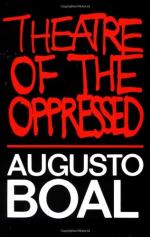|
This section contains 598 words (approx. 2 pages at 400 words per page) |

|
Chapter 1, Aristotle's Coercive System of Tragedy, How Aristotle's Coercive System of Tragedy Functions through General Notes Summary and Analysis
In "How Aristotle's Coercive System of Tragedy Functions", Boal dissects an Aristotelian tragedy. A hero has a tragic flaw, which has so far lead to happiness. The audience empathizes, and the same characteristic in the audience is stimulated. The hero falls, the peripeteia, and the audience fears that tragedy may befall them, too. The high status of the hero raises the stakes. The hero recognizes the flaw in himself, the anagnorisis, and the terrible end of the character, the catastrophe, reinforces in the audience the consequences of this flaw. The audience's fear and pity purges them of the flaw in themselves. Theater, Boal concludes, is a political coercive tool.
In "Different...
|
This section contains 598 words (approx. 2 pages at 400 words per page) |

|




